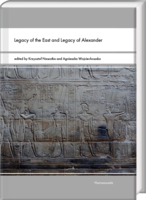|
weitere Titel zum Thema:
From the Hellenistic period until the Muslim Middles Ages, the words and deeds of Alexander the Great (356–323 BC) reverberated through the centuries. The tradition of his conquests and legends, which are best preserved in countless versions of the Alexander Romance, was a focal point of the conference in Wrocław 2019, the results of which are contained in this publication. The encounters between the European conquerors and the nations and cultures of the East, which are reflected in writings and works of art from East and West, enable us to gain a deep mutual understanding, even of the misunderstandings.
Contributions in this volume compare classical literary sources with non-European writings, epigraphic, archaeological and numismatic evidence. They explore the complexity of the classical source tradition in order to look beyond the boundaries of the time in which they were written down. By drawing on the methodology of the ‘literary turn’ in historiography, they draw our attention to ancient authors as conscious artists with their own agenda. An attempt is made to examine the Iranian background of Alexander’s politics and to verify modern hypotheses about his legacy in Iran and Central Asia. In Iran there was cultural continuity from the Achaemenid through the Hellenistic era, just as in Egypt, whose art absorbed non-native influences from the Saite period onwards. It is argued that the western influence or Hellenization that Alexander’s conquests brought to the heartland of the Persian Empire, its eastern part and Egypt, was limited. It shows that the last Persian king of Egypt, Darius III, and the first Macedonian pharaoh Alexander had more in common than is generally recognized. This book basically advocates the idea that a balance must be established between continuity and change, both in Egypt and in the East under Alexander and Hellenistic kings. |






